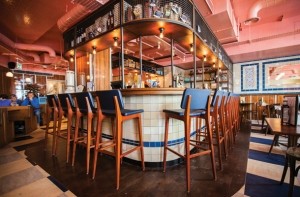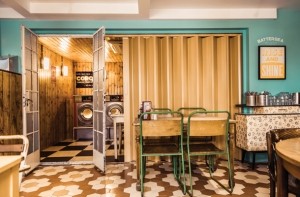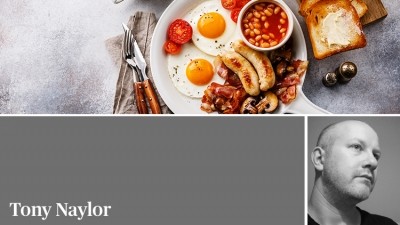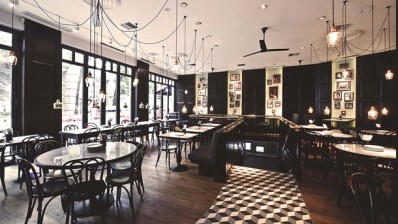Business Profile: The Breakfast Club
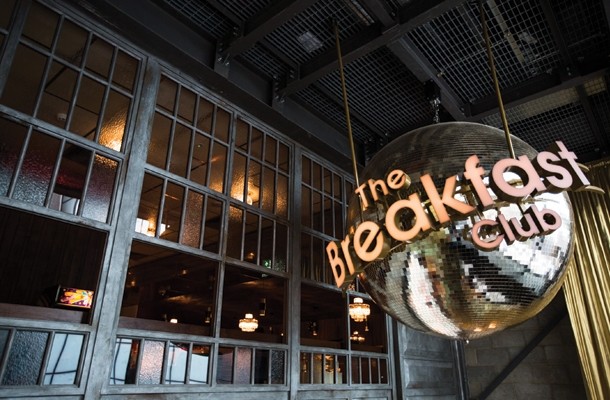
Visitors to The Breakfast Club’s website used to be greeted with the message ‘do you want to play a game?’, a reference to the classic 1983 film War Games. Last month, however, the Eighties-inspired restaurant group, itself named after another iconic film of the era, swapped it for a less arcane reference to the time – a logo in the kind of pixelated type once found on an Atari computer beside a man in a Miami Vice-style white suit.
For every person who got the reference, many more were left confused by the line, admits Jonathan Arana-Morton, who co-founded the burgeoning chain of brunch-focused restaurants with his sister-in-law Alison Rooney back in 2005. Thus the change was made. And while it might only be a minor one, it indicates an inclusiveness that will become even more important to the business as it continues on its growth trajectory.
Arana-Morton isn’t afraid of making much more significant reversals, it transpires. If it wasn’t for an early change of heart, he and Rooney could have been at the helm of one of the UK’s first burrito chains, Save Ferris, named after a scene in the film Ferris Bueller’s Day Off (are you seeing a trend here?).
“I had just been to the US and seen Chipotle and I thought it was amazing,” he says. “We had nothing like that back here at the time. We then had a moment of doubt when we thought it would never work. But look at the market now, it seems like there are hundreds of burrito shops.” Arana-Morton might still rue the missed opportunity to be at the vanguard of the now booming burrito scene had he and Rooney not gone on to launch The Breakfast Club and instead be at the forefront of the brunch revival.
Though neither had worked in hospitality – Rooney was a tour guide at Madame Tussauds and Arana-Morton was head of customer relations at Warner Bros before becoming head of PR at the Football Association – they had both dreamed of opening a café. This finally became a reality when the pair found a small café in Soho and spent a total of £140,000 getting it ready for launch, including filling it with curios from Arana-Morton’s childhood.
The slowly, slowly approach
Despite taking just £26.35 on its first day, the Soho café and, indeed, The Breakfast Club group as a whole has grown to become one of the capital’s most exciting restaurant concepts. The now eight-strong chain has arguably just had the most significant 12 months in its life cycle, with the opening of its largest site in Canary Wharf and its regional debut in Brighton. Last year, the group pulled out of opening on the site of the Black Cap in Camden, but is close to securing a site in Hackney Wick for an opening this spring.
“We have had four strong years in a row and while we are up again this year in terms of sales, it has been challenging in regards to launching two significant sites and structuring the business for further growth,” says Arana-Morton.
“This has been a huge year for the company in terms of restructuring to be ready to open two to three sites a year. We are not going to rush. We realised, after last year, that doing more than two or three openings a year would cause us all sorts of problems.”
So far the company has focused predominantly on London and Arana-Morton expresses concerns about trying to grow outside the capital, as well as inside it. “The attraction of the brand is the small, independent café tag it has,” he says. “We have to fight to keep it and if we reached 50 to 60 sites we would lose that. If we did go nationwide, it would be on a one-site-per-city basis, so it is still a novelty. In terms of awareness of the brand in London, there is a finite amount we could do there without damaging what we already have.”
Although Brighton seems like a natural step in regards to nationwide expansion, Arana-Morton describes it as “a fairly price-sensitive city that feels like a completely different market to London”. “What we do get is that brand awareness through the London commuters, but that is a double-edged sword,” he says. “Brighton is very supportive of independent businesses, and rightly so – that keeps the town what it is. So there is that brand awareness, but that can work against you because people can see you as this big bad brand from London. That’s why we intentionally opened there in a fairly low-key manner.
“It has also made us aware that we live in a bubble in London, where people queue outside our restaurants. We came to Brighton and that awareness wasn’t quite there yet. You have to work hard again to get people through your door, which is fine. It keeps everything fresh.”
Using its nous
With a clear obsession for 1980s films it might seem that The Breakfast Club is aimed at people in their forties for whom The Goonies, ET, Top Gun and Caddyshack don’t elicit a shrug of miscomprehension. Yet the company never set out to target any specific demographic, with Arana-Morton instead creating a place his friends would want to eat in.
“If you go on things that are of the moment, that will date pretty quickly,” he says. Likewise, the menu is an inclusive, crowd-pleasing affair, featuring a huge range of cooked breakfasts, cereals and pancakes for breakfast, and burgers, club sandwiches, tacos and salads for lunch and dinner. The group is best known, however, for its weekend brunch, served until 5pm, for which people routinely queue round the block. Its approach and popularity caught the eye of Paul Campbell, an early investor in Hawksmoor, Tortilla and Vinoteca and former chief executive of the Clapham House Group. Arana-Morton credits Campbell with helping the business “not make those big stupid mistakes, which set you back two or three years at a time”.
“There is a huge lack of experience in the business in terms of getting us to grow to a wider audience,” he says. “A lot of the people we employ have grown up through the business. It was a two-year courtship in terms of talking about what we wanted. It got to the point where we needed someone with a bit of nous to come in and help us.
“I am not the most business or commercially minded person in the world so it is good to have someone to whip me into shape and stop me from making any heart-over-head decisions. He (Campbell) has been tremendous – that little bit of advice he gives you when you are doing a property deal. In the past I would have been too scared to ask or not aware I could ask. He has been there as a good sounding board. What he is exceptional at, is that even though his interests are so varied, when he sits down with you, he always has time for you and is part of the business. He always says ‘when are we doing this?’ not ‘when are you doing this?’. It is those little things that make a difference.”
Anticipating approaches
On top of the cafés, the group operates four London speakeasies – The Mayor of Scaredy Cat Town, The King of Ladies Man, Call Me Mr Lucky and Dr Klugar’s olde Towne Tavern – designed to be slightly quirkier versions of pubs. The food offer is much simpler, with a tight range of hotdogs and chicken wings served at Call Me Mr Lucky, a cheeseboard, pulled pork sliders and a quesadilla platter at The Mayor of Scaredy Cat Town, and poutine, chips with chilli beef or curry sauce and hamburgers on offer at Dr Klugar’s, while the drinks offer majors on cocktails. As with The Breakfast Club, brunch is a key pillar of the bars, with bottomless boozy brunches available.
“They have worked really well. In terms of USPs, I can’t see that anybody else is doing a café and bar operation and dividing the two brands. The whole speakeasy thing is tongue in cheek. Sometimes we get criticised for it not being too secret. We stumbled on the idea of sticking the bar in the basement, and both operations work off each other and secure that all-day trade.”
With The Breakfast Club in the sweet spot of the all-day dining trend, it’s not surprising that there has been much interest in the company from investors. Arana-Morton admits he started receiving approaches following the opening of his third site, but has so far resisted the temptation to bite.
“We are not averse to bringing in new investment, but Ali and I want to stay in the business,” he says. “With any kind of money coming in, we would own the majority. What we have achieved so far we have done through our own money and borrowing from banks. At some point, we will have to find a way of securing the future of the business and that will mean bringing some new money in. nothing is imminent though.”
Arana-Morton is too humble to say it, but with his business increasingly being found on awards nomination lists and with the queues of people outside on a weekend showing no signs of abating any time soon, those approaches should become more frequent during the next 18 months. Ferris Bueller would be proud.
